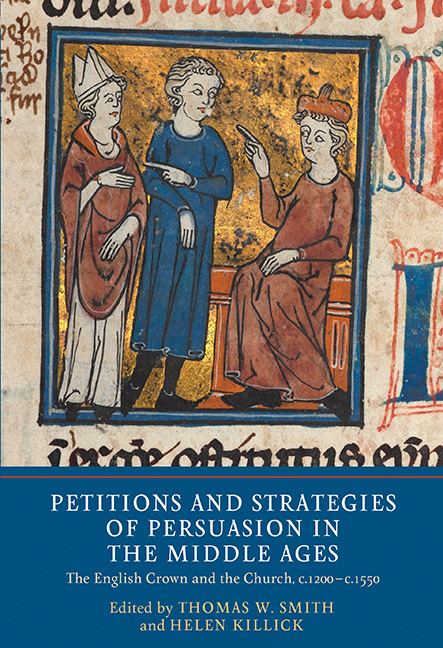 Petitions and Strategies of Persuasion in the Middle Ages
Petitions and Strategies of Persuasion in the Middle Ages Book contents
- Frontmatter
- Dedication
- Contents
- Contributors
- Foreword
- Acknowledgements
- List of Abbreviations
- Introduction: Medieval Petitions and Strategies of Persuasion
- 1 Blood, Brains and Bay-Windows: The Use of English in Fifteenth- Century Parliamentary Petitions
- 2 Petitioners for Royal Pardon in Fourteenth-Century England
- 3 The Scribes of Petitions in Late Medieval England
- 4 Patterns of Supplication and Litigation Strategies: Petitioning the Crown in the Fourteenth Century
- 5 Petitions of Conflict: The Bishop of Durham and Forfeitures of War, 1317–1333
- 6 A Tale of Two Abbots: Petitions for the Recovery of Churches in England by the Abbots of Jedburgh and Arbroath in 1328
- 7 ‘By Force and Arms’: Lay Invasion, the Writ de vi laica amovenda and Tensions of State and Church in the Thirteenth and Fourteenth Centuries
- 8 The Papacy, Petitioners and Benefices in Thirteenth-Century England
- 9 Playing the System: Marriage Litigation in the Fourteenth Century
- 10 Killer Clergy: How did Clerics Justify Homicide in Petitions to the Apostolic Penitentiary in the Late Middle Ages?
- Index
6 - A Tale of Two Abbots: Petitions for the Recovery of Churches in England by the Abbots of Jedburgh and Arbroath in 1328
Published online by Cambridge University Press: 20 August 2020
- Frontmatter
- Dedication
- Contents
- Contributors
- Foreword
- Acknowledgements
- List of Abbreviations
- Introduction: Medieval Petitions and Strategies of Persuasion
- 1 Blood, Brains and Bay-Windows: The Use of English in Fifteenth- Century Parliamentary Petitions
- 2 Petitioners for Royal Pardon in Fourteenth-Century England
- 3 The Scribes of Petitions in Late Medieval England
- 4 Patterns of Supplication and Litigation Strategies: Petitioning the Crown in the Fourteenth Century
- 5 Petitions of Conflict: The Bishop of Durham and Forfeitures of War, 1317–1333
- 6 A Tale of Two Abbots: Petitions for the Recovery of Churches in England by the Abbots of Jedburgh and Arbroath in 1328
- 7 ‘By Force and Arms’: Lay Invasion, the Writ de vi laica amovenda and Tensions of State and Church in the Thirteenth and Fourteenth Centuries
- 8 The Papacy, Petitioners and Benefices in Thirteenth-Century England
- 9 Playing the System: Marriage Litigation in the Fourteenth Century
- 10 Killer Clergy: How did Clerics Justify Homicide in Petitions to the Apostolic Penitentiary in the Late Middle Ages?
- Index
Summary
Among the articles of the peace treaty ratified by King Robert I of Scotland at Holyrood on 17 March 1328 and by King Edward III of England at Northampton on 4 May, a treaty by which England renounced all claims of overlordship or sovereignty over Scotland, is the following clause: ‘And it is the intention of the said King of Scotland, and of the aforesaid messengers and proctors of the said King of England that, by the treaties that are now made, no manner of prejudice should be done to the right of Holy Church in the one realm or in the other.’ Holy Church was quick to take advantage of this. On the day before the signing of the treaty, 16 March, Robert I inspected a number of charters granted by his predecessors to Durham Priory, thus confirming its possession of its Scottish cell at Coldingham; in England, the close rolls show instructions given on 31 August 1328, and again on 28 October, for the restoration of lands and possessions seized during the war to a variety of religious houses in Scotland. Two petitions asking for the return of such property, from the abbot and convent of Jedburgh and the abbot of Arbroath, survive in the SC 8 class at The National Archives, Kew, as numbers SC 8/16/756 and SC 8/16/757. We know from external evidence that they were presented to the Salisbury parliament of October 1328. Both concern the return of churches: Jedburgh claimed Arthuret in Cumberland and the advowson of Abbotsley in Huntingdonshire; Arbroath asked for Haltwhistle in Northumberland. The petitions received similar responses: inquisitions were to be held and justice was to be done; as a result, Haltwhistle was returned to Arbroath on 25 May 1329 and Arthuret to Jedburgh on 22 February 1330. (The inquisition into the advowson of Abbotsley was delayed by the death of one of those appointed to hear it and it remained in the king's hand, although the parson was ordered to pay the abbot the pension due from the church.)
What immediately strikes the reader of these petitions is the very different strategies used by the supplicants. In this chapter I examine these strategies and what they say about the two houses and their occupants during the First Scottish War of Independence.
- Type
- Chapter
- Information
- Petitions and Strategies of Persuasion in the Middle AgesThe English Crown and the Church, c.1200–c.1550, pp. 126 - 147Publisher: Boydell & BrewerPrint publication year: 2018


